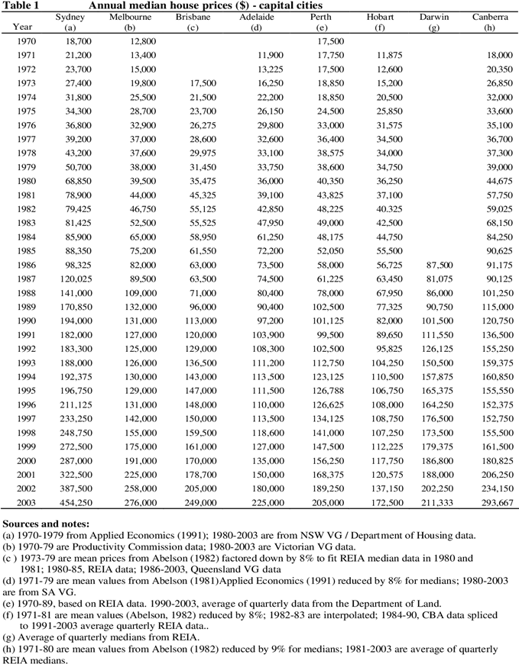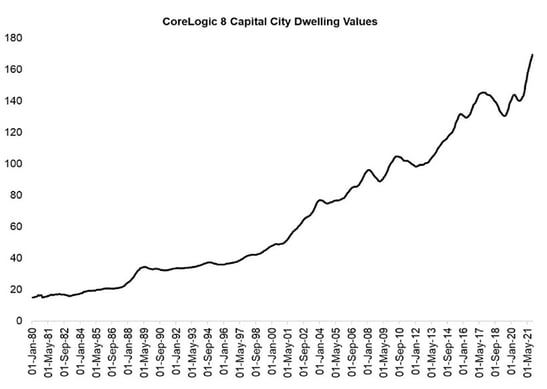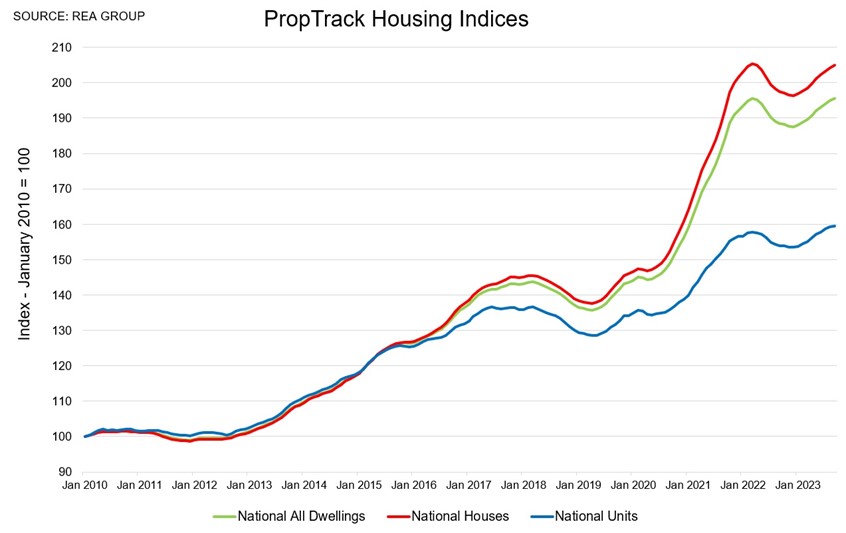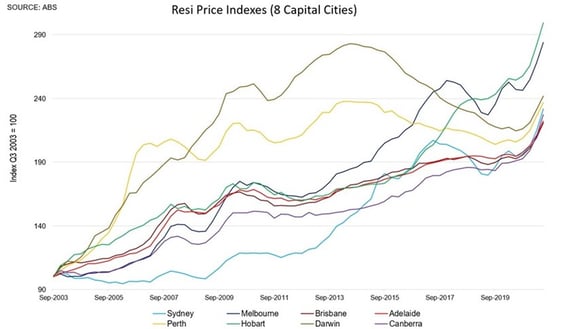Timing The Market... Or Time In The Market? - October 2023
October 18, 2023 / Written by Rich Harvey
By Rich Harvey, CEO & Founder, propertybuyer.com.au
Turbulent times
We see many potential property buyers thinking about buying a property, but holding back because they are concerned about the state of the property market rising or falling, or about broader economic conditions, or state of world events.
Some buyers want the ideal conditions to be present before they make a jump into the market.
Everything needs to be ‘just right’.
Yet the property market is always in a state of constant change - that's why it’s called a market!
And the problem is, there’s never a time when everything is ‘just right’.
Buyers and sellers have different motivations and desires.
At the moment the main concerns for buyers include geopolitical risks, rising oil prices, and interest rates.
On the other hand, population growth is running at the highest level in Australia’s history, rental vacancies have fallen to their lowest levels on record, rents are soaring, and there’s a chronic shortage of dwellings in the post.
As you can see, the stars will never align perfectly, and there are always seemingly valid reasons not to buy, despite the strong long-term performance of well-located real estate.
So if you are considering a purchase soon - should you be concerned about your timing, and how should you approach the market?
Before we get into the nitty gritty of this post, have a glance through the table below, which maps out median house prices by capital city from 1970 to 2003.

Your eyes aren’t deceiving you!
In 1970 a house in Sydney would set you back $18,700, and in Melbourne the figure would be $12,800.
Today the median house in Sydney would cost around $1.3 million, representing a compounding annual growth rate of more than 8 percent per annum.
With today’s median house prices in Melbourne sitting at around $1 million, this equates to a very similar growth rate over the past 53 years.
That’s compound growth in action: consistent capital growth experienced over time, results in spectacular results over the long term.
With that in mind, let’s take a think about…
Time in the market, or timing the market?
It’s often debated whether time in the market is more important than timing the market.
There’s no definitive answer – otherwise it wouldn’t even be a debate! - but of course the ideal outcome would be ‘both.’
Time in the market can allow compound growth the time to work its mathematical magic, especially if buy a quality asset in a suburb with a proven track record of long-term performance.
A wise old investor from Berkshire Hathaway once said that “time is the friend of the wonderful investment, and the enemy of the mediocre”, which suggests that over the long run it’s more important to buy well, and to worry less about market timing.
That said, if you can add some successful market timing then this can help you to achieve more sooner, potentially allowing you to grow your property portfolio and wealth more efficiently.
Many people try to outsmart the market and pick the perfect time to buy.
Some believe you should always buy as soon as you are able to.
Others still are far too cautious and are forever procrastinating or waiting for everything to be ‘just right’…which, of course, it never is!
Buying now or later
Do you believe in trying to time the market?
The opportunity cost of waiting can be high and many unfortunately do miss the boat.
Just think back to what even many of the top economist experts were predicting in April or June 2020: substantial market declines, which in the event never transpired.
In fact, we soon got exactly the opposite and many prospective buyers missed out completely.

We did finally get a downturn as interest rates increased, and yet by the third quarter of 2023, prices were back at record highs.
Who successfully predicted that?
Not me, that’s for sure!

For first homebuyers there may be a chance of being stuck renting for years when the opportunity to get in the ladder is not taken.
That’s a risk especially in the most expensive markets, such as Sydney, where prices have continued to rise fairly relentlessly over time.
Therefore is it better to buy well once you can get mortgage pre-approval?
In most cases, the answer is yes, provided your circumstances allow and you can comfortably manage the mortgage repayments.
Would you prefer getting in now and letting capital growth over time do the heavy lifting for you?
What do you believe are the pros and cons of waiting versus buying now?
No one size fits all
There is no one right (or wrong) way to do property buying or investing, and you have to choose how to chart your own course.
What else can buyers to get a ‘read’ on the market conditions?
There are more statistics and market research tools available than ever before, which can certainly help to understand market dynamics.
But even then they don’t always help even the best analysts to get the market timing right.
If you take look at the Australian Bureau of Statistics residential property price indexes, disaggregated by capital city, what can we learn?

A first observation is that the ABS indexes commenced in the second half of 2003, right at the peak of Sydney’s post-Olympics boom.
So for the first 5 or 6 years of the index the Sydney property market more or less went nowhere (though naturally some suburbs and property types fared better than others).
Markets can go sideways for quite a time, and occasionally a long time.
That’s not ideal, obviously, and Perth did the same from around 2007 onwards for many years, though the market is apparently now primed for a boom.
A second observation is that even if you bought at the absolute peak of the market in Sydney in 2003 you’d still have experienced capital gains through to the end of calendar year 2021 of approximately 150 per cent, following several strong periods of capital growth.
Including the leverage typically used in property bought with, say, a 20 per cent deposit, that still represents a fantastic return on investment over less than 20 years (given that a $500,000 purchase made in 2003 would likely have a market value of nearer $1.3 million today).
A third point of note is that although the various markets experience boom periods at different stages, over time the returns by capital city can be more similar than you might expect.
In fact from 2003 to 2021 the top performing capital city was also the cheapest at the outset: Hobart in Tasmania.
There are no definitive answers, here.
But ideally investors should look buy scarce assets in landlocked suburbs when they can afford to do so, and if they can successfully employ even an intermediate level of market timing than that should also help to improve the results.
But actually over the long run, acting when you can afford to do so may be what really counts.
The wrap
Buying as soon as you are qualified and able to is the best approach for most buyers.
The longer a buyers leaves their timing to enter, the more they need to generally save, and potentially they may get priced out of the market
Over the long run the ability time the market makes less difference than buying a proven performer of an asset.
Of course, there are rational reasons to be cautious today, as there always are.
But remember, this too shall pass, and I can guarantee you that in 2025 or 2030 today’s risks and concerns will have been replaced by new jitters and worries.
That’s just the way the media works these days.
I’m a buyer in the current market, personally.
Try to take a long-term view, and don’t get left behind.
To have one of our friendly Buyers' Advocate's contact you, click here to:
call us on 1300 655 615 today.














































.svg)
.svg)
.svg)



